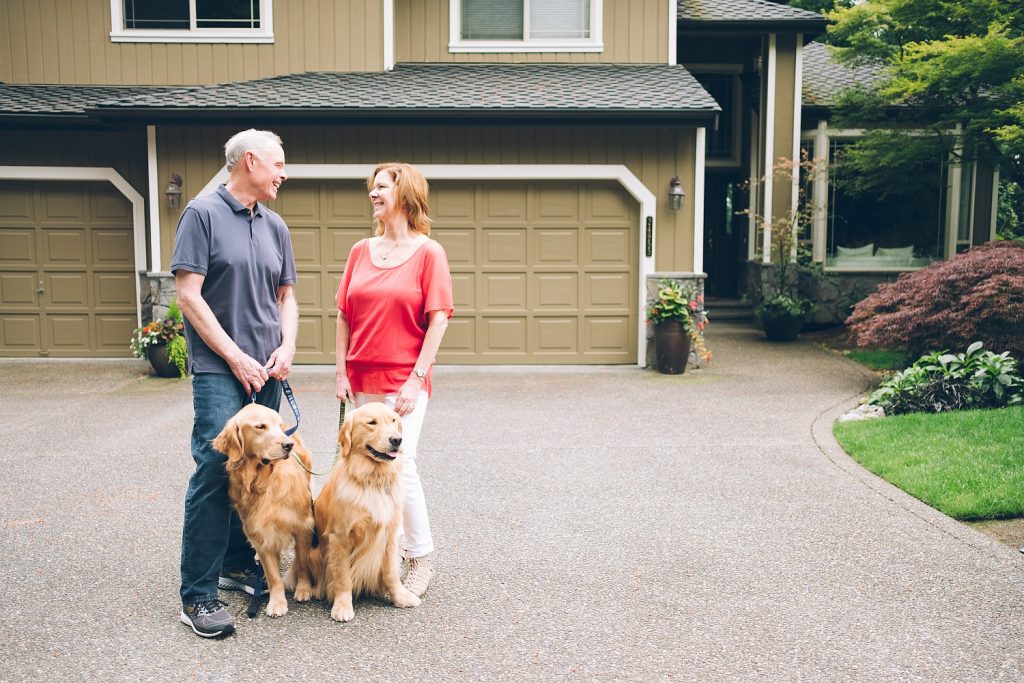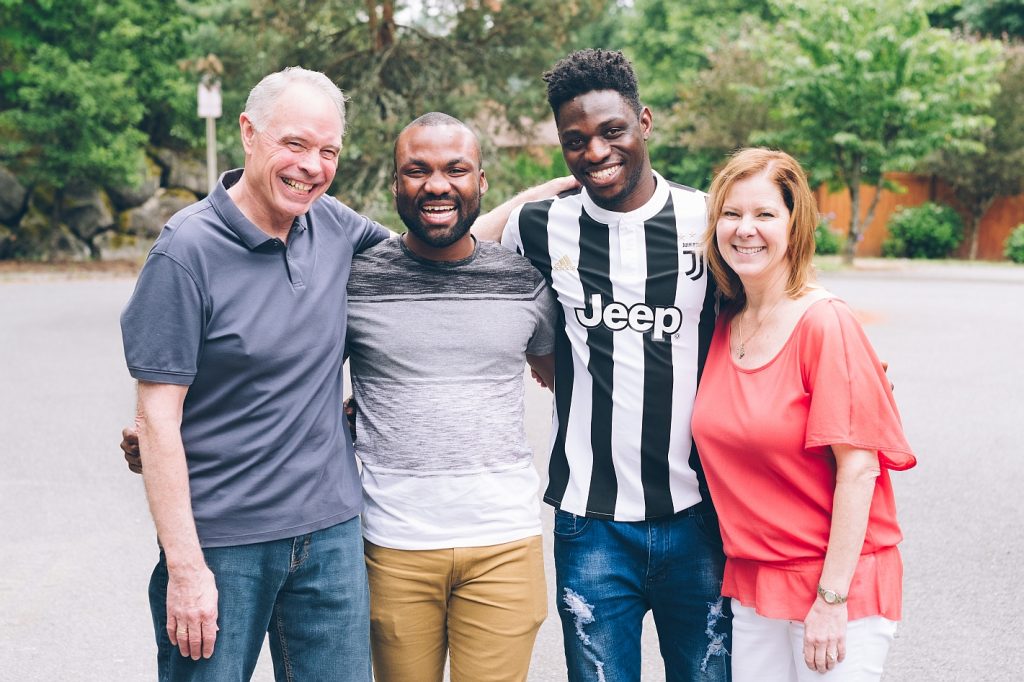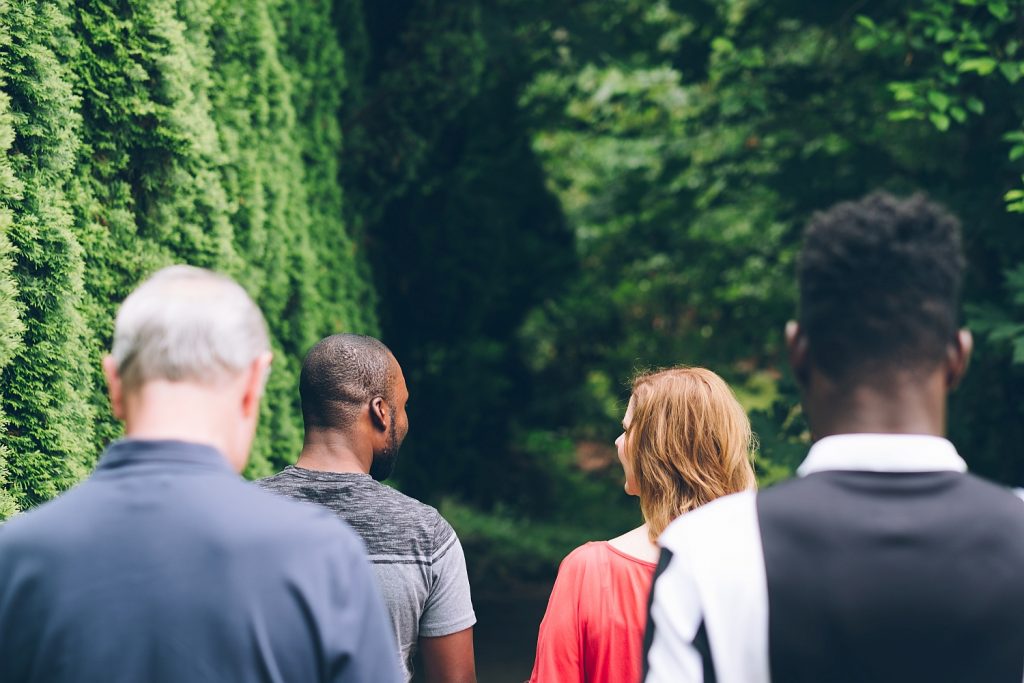The following is a reflection written by Liz Hadley, Employment Specialist at World Relief Seattle.
Pulling up to the McGlashan’s house, it seems as though you’re looking at the perfect retirement set up: a lovely house set on a quiet suburban street with two massive golden retrievers bounding out the front door. Their home appears to be a place to hunker down and, with the kids all out of the house, enjoy the life phase you’ve planned for years.
But in retirement, Lisee and Doug’s family is actually growing: they welcomed two boys into their family last year, and more are being added to the family every few months.

The two young men pulling up into Doug and Lisee’s driveway seem by all accounts, typical young men: driving a nice car, sporting their favorite soccer team’s jersey, eager for the pizza to be delivered. But as they hug Doug and Lisee saying “hi mom, hi dad”…I’m suddenly aware that we’ve met a family with an incredible understanding of what ‘family’ means.
These two young men, Kwaku and Arafat, are both from Ghana. Doug and Lisee are from the US. Having met only a few months ago, they call each other by familial terms now: “these are our boys” Doug and Lisee will tell you; “for me, they are my mom and dad” Arafat explains.
This unlikely family began from a bit of humorous rejection as Doug explains. Having signed up to be a Cultural Companion with World Relief, Doug was paired with a young man who had just been granted asylum. After trying to meet up a few times and begin building a relationship, the connection fizzled out as the young man quickly became busy with work and English classes.
So Doug tried again.
This time, it seemed that the new potential match wasn’t too interested in having a cultural companion. Three times Doug put himself out there as a cultural companion to no avail, leading him to begin wondering with a smile and slight laugh if it wasn’t him that was the “issue”. But time has a way of working things out, and Doug’s persistence led him to befriend and come to love an unlikely group of young men who, far from their own families, have come to see Doug as a father and Lisee as their mother here in their new nation.
In the summer of 2017, World Relief introduced Doug to Arafat. When you meet Arafat, you meet a gentle, kind and pensive young Ghanaian who stands tall above you, offers a radiant smile and speaks in what feels like an impossibly low register. During their first meeting together, World Relief’s Cultural Companion Coordinator sat with them to help with the admitted awkwardness of meeting a stranger for the first time, but after that they were on their own! And lucky for Doug, this match stuck.
In their first few times meeting up, Arafat referred to Doug as “Sir”…but the formality didn’t suit Doug. In searching for a new way to refer to one another, Arafat asked if he could call Doug “dad”, This time, the term seemed fitting.
Conversations quickly turned to classic father/son topics: what to look for when buying a car, plans for furthering your education, understanding what’s happening on the field at an American football game, and what qualities to look for in a partner.
Arafat grew to know Lisee as well and naturally referred to her as “mom”. When I met with the family over pizza to hear their story, Arafat explains to me that he lost both his parents when he was young. He grew quiet and, in a manner fitting of a toast, described how much respect he had for Doug and Lisee, how much they had helped him, welcomed him and loved him. Turning to look at Doug and Lisee, Arafat said “I love you dad, I love you mom.” It was all I could do to not drown my slice of pizza in tears.
On the kitchen counter when you walk into the McGlashan house, sits a little shrine capturing their family: a photo of their adult daughter, a picture of their two Goldens, and a small balloon that says “I love you mom”. Lisee explains to me that this gift is from her boys. For Mother’s Day this past year, Arafat brought over flowers, a massive teddy bear, and this balloon. The balloon now sits amongst the mementos to biological children and pets they’ve cared for over years. It’s clear that the concept of family is being blown wide open for the McGlashans.
It’s not only Arafat whose been added to the family though–he has the natural ability and tendency to connect people. In being resettled by World Relief, Arafat was placed in an apartment with a handful of other young men, many of whom are now his close friends. As a bit of a leader amongst the apartment, Arafat began introducing his friends to Doug and Lisee, and over time and several shared meals, these young men also grew to trust and love the McGlashans, calling them mom and dad as well. When Doug and Lisee now talk about “their boys”, it’s this group of young men they’re referring to.
To be honest, when I first heard the “mom and dad” thing, I was a bit skeptical and wondered how deep these relationships had actually gone. Lisee shared with me a story from early on in their relationship though that reminded me of something my parents would do for me, thus dispelling my skepticism. Over the summer, Doug and Lisee took a vacation and were without cellphone coverage for a few days. During their time away though, they just had to find reception and call their boys to check in and see how everyone was doing. It turned out everyone was doing just fine, but one of the boys was anxiously waiting for them to return home so he could get their advice on a potential car purchase. After all, he had promised before they left not to make the purchase without first running it by them. It’s a subtle gesture – calling just to check in – but it communicates volumes. Arafat and his friends never expected to have this in America: someone who would call just to check in, just to say hi, just to remind them that someone cared for them and saw them. Hoping to find safety in America, they had also found family.

The other young man joining us for pizza today is Kwaku, another Ghanaian who Arafat met through World Relief, and another one of “the boys”. Kwaku
and Arafat didn’t know each other back in Ghana. Though from the same city, they had grown up in different communities; one being raised in a Muslim community, the other in a Christian community. Today before sitting down to eat, we all stand in a circle, hold hands, listen to Doug’s blessing, and finish in a collective “amen”, feeling quite naturally at home and at ease with one another.
Kwaku and Arafat both came to the United States seeking the protection of political asylum. Fearing for their lives for different reasons, they both left their country on a plane headed to Brazil where they would begin their journey on foot…all the way up through Central America to the US/Mexico border. It’s there that they asked for asylum.
In writing this story, I attempted to look up how many miles their journey took them – walking from Brazil to Tijuana. Google Maps tells me “walking route not available”.
When I ask them, Kwaku and Arafat have no idea how many miles it was; for Arafat, the journey took about three months, for Kwaku it took four months. Over our lunch at the McGlashan’s they share with us a bit about the journey, naming off the countries they passed through as if it’s a geography quiz: “Brazil, Ecuador, Columbia…”
Every time I listen to an asylee recount the story of their journey to the US, without fail they each grow quiet when they speak of Panama – “The jungle…you have no idea what I have seen there…”
Along the border of Columbia and Panama lies the Darién Gap, a nearly 60-mile section of dense rainforest. For more than a century, humans have tried to tame the jungle in the Darién Gap, but the jungle has consistently rejected their efforts. This portion of the trek north for asylum seekers is by far the most perilous: those on the journey blindly follow a path through the jungle for days, hardly daring to stop and sleep for fear of what might come upon them. For days they push on: “you can’t stop, you just have to keep walking.” Some migrants carry a bag of sugar with them on this leg of the journey, eating spoonfuls to keep them awake and moving. Robbers, drug traffickers, smugglers, animals and the elements can meet you on the path…it’s better to move through as quickly as possible.
The journey through the jungle crosses wide rivers, two mountains and is strewn with discarded items that migrants who have come before deemed too much to carry. The way is also marked by graves. Arafat keeps his eyes on his plate while he tells me of one woman he journeyed with being bitten by a poisonous snake. “We didn’t have any medicine”, he explains. He describes another night in the jungle when their group was ambushed and searched for money and valuables. He smiles a bit proudly as he recounts to us how he had split up his money between the lining of his hoody and inside his shoes so as to evade a search like this one.
Kwaku’s journey to the US took a month longer than Arafat’s, owning to the fact that in one country, police intercepted him and deported him back to a neighboring country. For most people, this set back is too demoralizing, Kwaku explains. Many people have struggled on the journey too much and feel they don’t have the energy or courage to retrace their steps. They give up and retreat back home, resigning themselves to the danger awaiting them there. But for Kwaku, he pressed on.
As he recounts a bit of his journey, it reminds me of stories from the underground railroad: a kindhearted stranger offers shelter for the night and bread for the next day’s journey; a bus is pulled over and searched because passengers explained to police that there are “black men” on board. And one puzzling story in which a border patrol agent slips him a piece of paper with Spanish scribbled on the back. He’s quickly told to show this paper to agents if he’s detained at the next border, but he forgets this prompt and sits for several hours in a jail not sure if this is the end of his journey. Suddenly remembering the paper, he shows it to agents and is freed to continue on his journey. To this day, he’s not sure what was written on the paper.
Having made it to the US border, Kwaku and Arafat both began the process of seeking asylum, a process which involves being handcuffed and taken to a detention facility. Both expressed to me their shock around this treatment. Arafat motions to his wrists and ankles explaining how he didn’t imagine that in the US he would feel like a criminal. After waiting months in the Northwest Immigration Detention Center – a facility where the lights are never turned off, even for sleeping, and you’re paid $1 a day for your work – both Kwaku and Arafat won their cases, were granted asylum, and allowed to begin their lives in the US.
Through World Relief’s Asylee Resettlement program, they both worked with a caseworker to secure housing, apply for documents and become oriented to their new community. They enrolled in English classes, employment services, and luckily for the McGlashans, were open to meeting other Americans through the Cultural Companion program.
Both Kwaku and Arafat now work as security guards at a prominent Seattle security company and balance hectic schedules of night shift jobs and college classes. Kwaku has already been promoted at his job and Arafat was offered a promotion, but in wanting to give the company his best, he decline the offer explaining that he wanted to improve his English before taking on the position. True to the example other asylees have set before them, Kwaku and Arafat are incredibly hardworking and jumped right in to the work of rebuilding their lives.
Before meeting Arafat, Doug and Lisee had never met an asylee before, let alone fully knew what the term meant. Over lunch, we ask about their experience through all of this, what it’s been like to build this relationship which started as a formal “cultural companion match” and has grown into an authentic relationship.
“We’ve received so much more than we’ve given…how rich it is for us, to have their stories as part of our stories now” Lisee explains.
Addressing Kwaku and Arafat, Doug explains, “It’s inspiring, because when you hear what you’ve been through to get here, I can’t imagine what it took to survive that. And then when you arrive here, it’s so gratifying to see how you take on your dreams and ambitions. It’s an honor to watch you become who you want to be….it’s wonderful to be together like a family and watch our relationship grow.”


